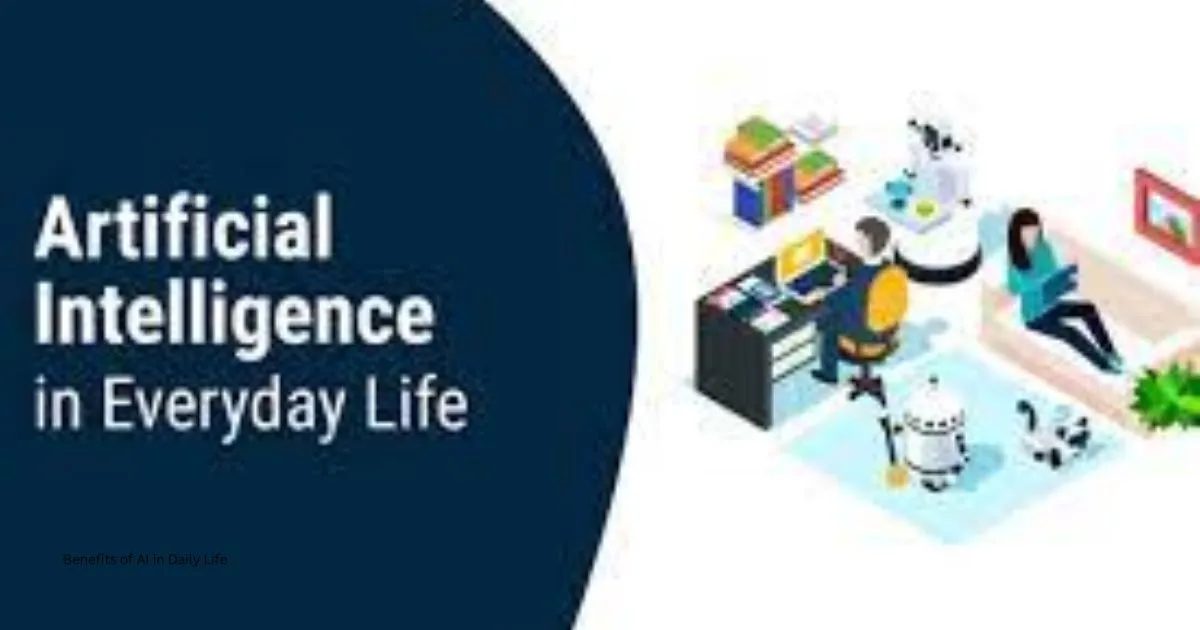Benefits of AI in Daily Life: 15 Powerful Ways It’s Transforming Your World

Benefits of AI in daily life are no longer a futuristic concept—they’re happening right now, all around you. Whether it’s setting your morning alarm with Siri, getting a movie suggestion on Netflix, or using Google Maps to avoid traffic, AI is silently making your day easier, faster, and smarter.
From smart assistants like Alexa answering your questions to facial recognition unlocking your phone, artificial intelligence is woven into our routines. And here’s the best part—you don’t need to be a tech expert to benefit from it. Whether you’re a student, a parent, or a professional, AI tools are designed to be simple and accessible.
In this article, we’ll take a deep dive into the most practical and powerful ways AI is transforming everyday life. You’ll discover how it improves convenience, productivity, health, safety, and much more. Let’s uncover the real-world benefits of AI you might be using without even knowing.
Table of Contents
How AI Touches Every Part of Our Lives
Artificial Intelligence is no longer a sci-fi dream—it’s already here and working silently in the background. Every time your phone unlocks using face recognition or your music app creates a playlist just for you, AI is at work. The benefits of AI in daily life go far beyond convenience; they touch areas like safety, efficiency, personalization, and even emotional wellness.
Today, AI is being integrated into more aspects of our lives than ever before. From smart homes that learn your behavior to wearable health monitors and intelligent personal assistants, AI is quietly becoming your invisible partner. And the best part? You don’t need to be tech-savvy to enjoy the benefits.
Daily Personal Life Benefits
Smart Assistants Like Alexa and Siri
Smart assistants have changed the way we interact with technology. With a simple voice command, you can play music, set reminders, ask about the weather, or even control your lights. These AI tools learn your habits and preferences over time, making interactions smoother and faster. They’re like having a digital personal assistant always ready to help.
AI in Smartphones: From Photos to Predictive Text
Ever wonder how your phone automatically enhances your pictures or suggests the perfect reply in a text conversation? That’s AI in action. Your device uses AI to recognize faces, improve lighting in photos, and suggest words as you type—making communication quicker and photos more professional-looking.
Personalized Recommendations on Netflix, YouTube & Spotify
Whether it’s a binge-worthy show or the perfect playlist for your mood, AI analyzes your viewing or listening history to offer content that suits your taste. These systems learn over time to provide better suggestions, which means less scrolling and more enjoyment.
AI in Home Management
Smart Homes and Energy Efficiency
AI-enabled thermostats and lighting systems adjust themselves based on your routine and usage patterns. This means lights turn off when rooms are empty and temperatures are optimized for comfort and savings. The result? Lower energy bills and a more sustainable lifestyle.
AI-Powered Security Systems
AI-driven security cameras can recognize familiar faces, detect suspicious activities, and send real-time alerts. This added layer of intelligence reduces false alarms and increases the effectiveness of your home security setup.
AI at the Workplace
Boosting Productivity with AI Tools
From writing emails to managing projects, AI tools like Grammarly, Notion, and ChatGPT are changing the game. They help you work faster and more accurately, minimizing human error and freeing up time for more important tasks.
Virtual Assistants and Meeting Scheduling
Tools like Google Assistant and Microsoft Cortana schedule meetings, manage your calendar, and send reminders. They understand natural language, which means you can talk to them just like you would to a coworker.
AI in HR and Recruitment
Hiring processes are becoming more efficient thanks to AI. It can scan thousands of resumes in minutes, shortlist the best candidates, and even conduct preliminary interviews using chatbots.
AI in Health and Wellness
AI in Fitness Trackers and Health Apps
Smartwatches and apps use AI to track your activity, heart rate, sleep, and calories. They also give you insights on how to improve your health, making them great companions for a healthier lifestyle.
Early Diagnosis and Disease Detection
AI algorithms analyze medical images and data to spot signs of diseases earlier than traditional methods. This can be life-saving, especially in cases like cancer where early detection is crucial.
AI in Mental Health Support
Chatbots and mental health apps powered by AI offer emotional support, daily check-ins, and coping strategies. While not a replacement for professional care, they’re a helpful addition to mental wellness.
AI in Education
Personalized Learning Platforms
Platforms like Khan Academy and Coursera use AI to personalize your learning path. They identify weak areas and offer practice exercises, videos, or notes based on your individual progress.
AI Tutors and Homework Help
AI tutors like ChatGPT answer questions, solve math problems, and explain difficult concepts. They’re available 24/7 and are especially helpful for students who need help outside classroom hours.
AI in Transportation
Navigation and Real-Time Traffic Management
Apps like Google Maps use AI to predict traffic, suggest faster routes, and estimate your arrival time. They process data from millions of users in real time, saving you time and fuel.
Autonomous Vehicles: Future of Travel
AI is at the heart of self-driving cars. These vehicles can detect obstacles, follow traffic laws, and even predict the behavior of other drivers—making transportation safer and more efficient.
AI in Shopping and E-commerce
Personalized Shopping Experience
E-commerce platforms track your preferences to show you the most relevant products. AI also powers “virtual try-ons” for clothes and accessories, making online shopping more interactive.
Chatbots for 24/7 Customer Support
AI chatbots can answer questions, help track orders, and solve basic issues—all day, every day. They reduce wait times and offer instant assistance, improving the customer experience.
AI for Financial Management
Budgeting and Expense Tracking
Apps like Mint and Cleo use AI to monitor your expenses, categorize spending, and suggest savings plans. They can even alert you when you’re overspending or approaching your budget limit.
Fraud Detection in Banking
AI algorithms monitor transactions for unusual activity. If they detect anything suspicious—like a sudden large transfer—they immediately flag or block it to protect your money.
Challenges and Ethical Concerns of AI
Despite the benefits, AI brings challenges. Privacy issues, algorithmic bias, and job automation are key concerns. Responsible use, ethical development, and government regulation are necessary to ensure AI benefits society as a whole.
Future of AI in Our Everyday Lives
In the coming years, AI will become even more seamless. Think: refrigerators that order groceries, AI doctors providing second opinions, and education systems that teach based on your emotions. The possibilities are endless—and exciting.
Conclusion: (Benefits of AI in Daily Life)
Artificial Intelligence isn’t just changing how we live—it’s improving how we live. The benefits of AI in daily life span every aspect—from convenience and productivity to safety and well-being. Embracing AI doesn’t mean losing control to machines; it means using smart tools to live a smarter life. And this is just the beginning.
FAQs: (Benefits of AI in Daily Life)
What are the most common uses of AI in daily life?
Voice assistants, recommendation systems, navigation apps, smart home devices, and personal finance apps are the most common AI-powered tools.
Can AI really improve health and wellness?
Yes, AI is used in fitness trackers, mental health apps, and even in detecting diseases early—offering significant health benefits.
Is AI safe to use in homes?
Generally, yes. As long as you’re using reputable brands and keeping devices updated, AI in homes is safe and secure.
Does AI invade privacy?
It depends on how it’s used. Always review app permissions, terms of service, and privacy policies to maintain control over your data.
How is AI helping in education?
AI offers personalized learning experiences, instant tutoring help, and progress tracking to make education more effective and accessible.






